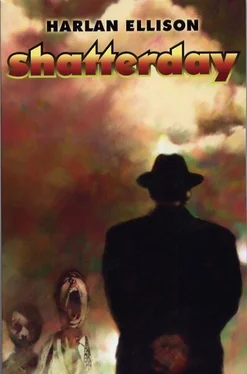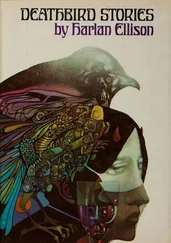The flying wing sailed back overhead, dipped, caught a downdraft, swooped and filled itself with sound, and rose on its forked tail. It went straight up and was lost among the spilled milk of the stars.
“The rope was frayed. I think it must have rubbed against some rocks. We didn’t see. We could have gotten away, I’m sure of that. Hemp. Perhaps we would have done better had we used hemp instead of manila. Some day they’ll make better ropes.”
A gentle purple light began to seep out of the dark stones of the altar. Michel felt warmth at his back. He looked over his shoulder and the glow was growing, enveloping him. It was like a tepid bath. It cut off the chill of the night, but not the darkness. The darkness remained and the silent creatures remained, but the maquisards were dead and could not return.
“They fell. And I fell with them. But something very peculiar happened. There was a place in the air, and I fell through it, and the others went down, but I didn’t. You may think it odd that I don’t question what happened. My mother was a gypsy. I don’t question such things. Or the music. Magic shouldn’t be questioned. If this is magic. I don’t know. But, listen, all of you, listen for a moment longer, then I’ll play you many songs, “Avalon” and “Nuages” and even a lovely song I know, “Stardust,” that you will enjoy. What I need to know is the way back. I don’t question, you understand, but I want to get back, to tell some people what happened to little Gaston and Claudeville; and I really must tell Bernot’s daughter that he died for her and for France. Can you understand what I’m asking? Do any of you speak?”
But there was only silence.
So he played the songs for them, because they would have spoken if they could. He knew that. And they enjoyed the music. He was a wonderful musician.
And the stürmerkommandos did not come.
The purple glow settled around Michel Hervé and the silent creatures watched him, and suddenly he stopped playing. They watched him for a time, but he did not seem inclined to play more, and they went away silently, one by one.
He dragged the canister wearily. If he had known why he was compelled to burden himself so, it might have been easier. But he had no idea. The canister had been there in the golden sand when he had drifted down through the air from the space where the peculiar passage had occurred. He had understood, without questioning, that this was a thing he had to keep with him. He even knew it was leaking death, but he had attached the rope and had assumed the burden.
And when he came to the second altar, much larger but exactly identical to the tiny one of dark stones where he had rested, he knew he should bury the canister there.
So he did, and he lay down a good distance from the leaking metal container, and he waited for someone to come and tell him what he should do. He perceived that he had no control over what was happening to him, that where he was and what it meant would probably never be revealed to him, but that he must be patient.
All through the night that stretched on without end, he waited; sometimes sleeping, sometimes letting the music have its life. And in the night the dark stones of the great altar let loose the purple glow, and he was bathed in the radiance. When he awoke, there was day all around him, and the purple glow was faintly discernible, but there was still no sun, not of any color.
But Claudeville and Bernot and little Gaston were there. They sat around him, cross-legged on the golden sand, and they waited for him to awaken. For just an instant he was happy to see them, but then he understood that they were dead, and he sat up with pain in his face.
“Now I must make the choice, is that it?” he said.
They watched him. They did not plead nor did they try by their deaths to shame him. They merely sat quietly, as the animals had sat. They presented him with the other side of the question by their presence.
“If the music, then you cannot go home, eh, Gaston, little friend? Claudeville? Bernot, I’ll never smell your pipe tobacco again? Is that it? If I want to make the music?”
The glow from the altar surrounded them, because the time for making the decision was at hand.
“And what of this metal thing with the death in it? Does that come with me and my music, or does it stay here where no one will ever suffer from it?”
Spectacular runs of notes cascaded through his mind.
He began to breathe very heavily. He felt himself about to cry. He didn’t want to cry; he knew what that would make him decide.
“I have no choice,” he said. “It is the music. It was always the music. Forgive me. You understand, perhaps you won’t understand, but you died for something you loved, and I would do the same. But to live for it is even better.”
And he made the choice, and was returned, and the dead remained dead, and the canister came soon after, but not soon enough for the stürmerkommandos to use it.
And he made great music for a while, for just the little while that he bought in that peculiar place of silent animals and dark stone altars. And it was great music, because he became a jazz legend, even with two dead fingers, and buying those few years was the only brave thing he could do.
His name was Michel Hervé and when he died, he died honorably.
This story is dedicated to the memory of Django Reinhardt. the greatest jazz guitarist who ever lived; and to the music that he left us
Count the Clock that Tells the Time
Introduction
For those whose reading taste runs to People Magazine and TV Guide, whose idea of “conversation” is the self-aggrandizement and flotsam-jetsam chitchat of The Merv Griffin Show, who cannot wait to buy books that reveal Elvis Presley was a dope addict and that Errol Flynn was a Nazi spy (Jesus, do you believe that lunacy? Robin Hood was a Nazi spy! Gimme a break, Lord!)—for all such open receivers of meretricious, mischievous gossip who happened to wander in here, I offer the current information that my fourth marriage broke up several years ago and I am once again loose on the streets of the world.
Why does he tell us this?
I tell you this because the story you’re about to read was begun on the shores of Loch Tummel in Scotland on October 12, 1975, during a stay at the Queen’s View Inn while in company with Lori, whom I later married. (For historians of trivia, I asked Lori to marry me on Saturday, May 8, 1976; we were married on Saturday, June 5, 1976; she left me for Smilin’ Jack on Saturday, November 20, 1976; and the divorce was effected on Wednesday, March 16, 1977.)
I was in love. Apparently Lori was in love. We were in love with each other. And I began what I intended as a love story. Things began falling apart, though, even before we were married; and I wrote only three pages of the story that Sunday night at the Queen’s View. The day before we’d taken the train to Edinburgh, we’d wasted most of the day sleeping in at the Portobello Hotel in London. I’d awakened several times during that lazy morning and afternoon that I’d intended to spend revisiting for the third time the Tate Gallery, and I was struck by how much valuable time is wasted in even the most adventurous and event-filled life. Thought about that, lying there staring out through the French doors at the Stanley Gardens, and went back to sleep. Woke later, more time gone, and thought about it again as a fly buzzed through our room. And slept again.
Just so are stories born. Apocryphally, on that day were sown the seeds of the dissolution of love and marriage—even then, before we were wed, it was falling apart.
And the next evening, in Scotland, where I’d longed to live for as far back as I could remember, sitting there before a roaring fireplace in the Queen’s View Inn, I was overcome with the painful knowledge that I was alien to that place, that love somehow would not endure, that I could never come to make my home in Scotland, and I began the story.
Читать дальше












